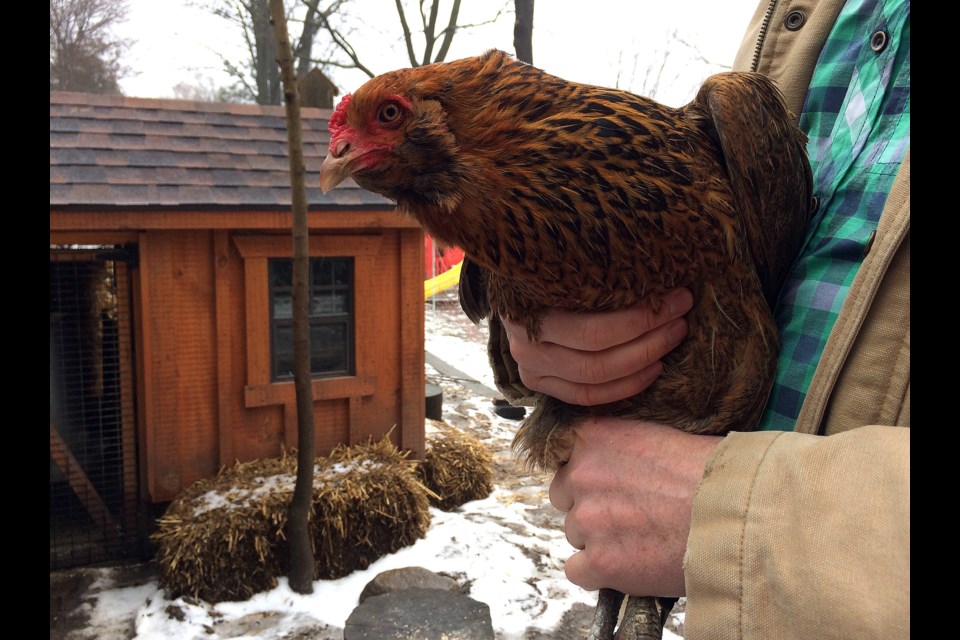There is a growing trend among city dwellers to raise chickens in their backyards, but there are many things people should know before they start flocking to the nurseries and stocking their coops.
“If people say they are going to do it for cheap eggs I get a chuckle because you can get fresh eggs from our commercial industry for $2 to $4 a dozen,” said Al Dam, provincial poultry specialist for OMAFRA. “You won’t get that from a backyard flock. It can easily be four to 10 times what you will pay at the grocery store when you factor everything in, between feed, shelter, heating through the winter and vet bills.”
Dam will be facilitating a workshop March 21 called Raising Backyard Chickens hosted by the Poultry Industry Council at their headquarters in the Kay House at 483 Arkell Rd.
“There will be lots to learn especially for people who haven’t done this before.” said Charlotte Wall, events and communication coordinator for the Poultry Industry Council. “It is a half day event and includes lunch for about 20 people.”
The workshop has been organized in response to growing local interest in raising backyard chickens.
“We started with Guelph because the city reached out to us.” said Wall. “We chose the spring so people can be set up and have eggs in time for Easter.”
It will be a comprehensive look at the pros and cons including many things people might not consider before they commit to the idea.
“I try to condense 20 years of industry experience into a half day,” said Dam. “They do allow birds in Guelph but they changed the bylaw in the last two years. I get a couple calls a month from municipalities looking into it or trying a pilot. The exact number of municipalities that allow it is a bit of a moving target because some have tried it and decided against it and some are considering.”
Most municipal bylaws including Guelph’s are based on OMAFRA recommendations.
In all cases the birds must be properly contained on the owners property a reasonable distance from their neighbour’s property and the coops must be winterized to keep the animals comfortable through the winter even when they aren’t laying eggs.
“I would not recommend more than four hens in an urban setting because when hens are at full production you are getting an egg a day so with four hens that is more than two dozen eggs a week,” said Dam. “A large family may consume that but it can be a lot and that brings up issues of food safety and what you do with those eggs.”
He discourages keeping roosters.
“For one, you don’t get eggs from a rooster and they will be very vocal and can be aggressive,” he said. “Roosters don’t just crow at the crack of dawn. They crow at any time of the day or night and that can raise noise issues with neighbours.”
There is also an issue with waste disposal.
“You are going to get about a pound of manure per hen per week and it is pretty potent stuff,” said Dam. “We don’t recommend putting raw poultry manure on your vegetable garden because if the birds have salmonella for instance that will be in the manure. There is a possibility of it transfering to your vegetables.”
It can be used for fertilizer if properly composted.
“We recommend that you compost it with proper substrate and let it go through the heat cycle that will kill any potential pathogens,” he said. “Once it has been composted it is an excellent fertilizer.”
There are other health issues related to handling the birds.
“I recently read an article about people in the US dying from kissing baby chicks,” said Wall.
It is more common than people might think.
“Some of the issues we’ve had are with chicks that are salmonella positive and you have kids handling them improperly,” said Dam. “If you’re not washing your hands or you are kissing the birds and having direct contact with them and your face there is a chance for a transfer to happen.”
Dam will, among other things, advise workshop participants on ways to discourage urban vermin or predators and will provide them with a list of local feed and equipment suppliers as well as veterinarians that treat livestock.
“You need a veterinarian with a food animal license,” he said. “Vets just licensed for companion animals can’t treat animals used for livestock. So housing and veterinary care are things you have to worry about. That’s why a lot of municipalities going through this are really taking their time to develop good bylaws to deal with these issues.”
Despite all the cost and effort there are benefits to raising backyard chickens.
“The cost can be really high when you factor everything in but you get to learn where your food comes from and it helps with the local food movement,” he said. “That more or less covers it.”
To enroll in the workshop or learn more about raising backyard chickens call 519 837-0284 or visit: www.poultryindustrycouncil.ca


